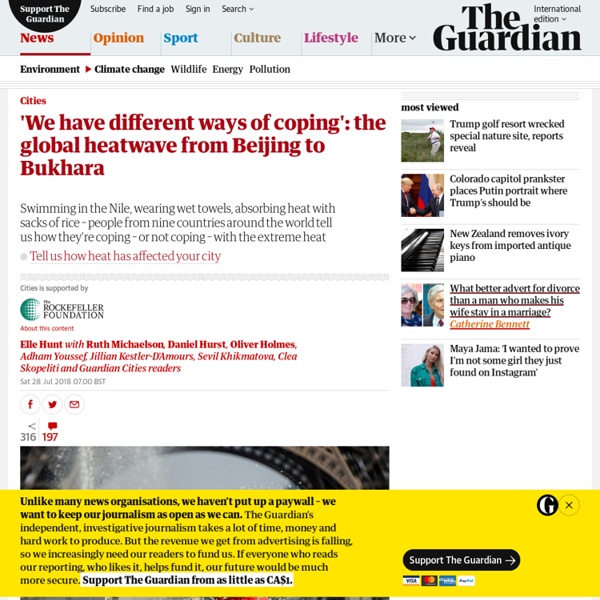Climate change will displace millions
Wildfires tearing across Southern California have forced thousands of residents to evacuate from their homes. Even more people fled ahead of the hurricanes that slammed into Texas and Florida earlier this year, jamming highways and filling hotels. A viral social media post showed a flight-radar picture of people trying to escape Florida and posed a provocative question: What if the adjoining states were countries and didn’t grant escaping migrants refuge? By the middle of this century, experts estimate that climate change is likely to displace between 150 and 300 million people.
Taking Notes By Hand May Be Better Than Digitally, Researchers Say
Laptops are common in lecture halls worldwide. Students hear a lecture at the Johann Wolfang Goethe-University on Oct. 13, 2014, in Frankfurt am Main, Germany. Thomas Lohnes/Getty Images hide caption toggle caption Thomas Lohnes/Getty Images Laptops are common in lecture halls worldwide.
The 2018 Midterms and the Specter of Voter Suppression
Read: The ‘hubris’ of the Supreme Court’s voting-rights ruling On Saturday, President Donald Trump ensured that the issue would be front and center as Election Day approached. “All levels of government and Law Enforcement are watching carefully for VOTER FRAUD, including during EARLY VOTING,” he tweeted. “Cheat at your own peril.
This Week’s Awesome Stories From Around the Web (Through July 20)
Boston Dynamics’ Robots Are Preparing to Leave the Lab—Is the World Ready?James Vincent | The Verge “After decades of kicking machines in parking lots, the company is set to launch its first ever commercial bot later this year: the quadrupedal Spot. It’s a crucial test for a company that’s spent decades pursuing long-sighted R&D. And more importantly, the success—or failure—of Spot will tell us a lot about our own robot future.
Almost all world’s oceans damaged by human impact, study finds
Just 13% of the world’s oceans remain untouched by the damaging impacts of humanity, the first systematic analysis has revealed. Outside the remotest areas of the Pacific and the poles, virtually no ocean is left harbouring naturally high levels of marine wildlife. Huge fishing fleets, global shipping and pollution running off the land are combining with climate change to degrade the oceans, the researchers found. Furthermore, just 5% of the remaining ocean wilderness is within existing marine protection areas.
Plummeting insect numbers 'threaten collapse of nature'
The world’s insects are hurtling down the path to extinction, threatening a “catastrophic collapse of nature’s ecosystems”, according to the first global scientific review. More than 40% of insect species are declining and a third are endangered, the analysis found. The rate of extinction is eight times faster than that of mammals, birds and reptiles.
Digital Collections, Available Online
Collection Alan Lomax Collection The Alan Lomax Collection includes ethnographic field documentation, materials from Lomax’s various projects, and cross-cultural research created and collected by Alan Lomax and others on traditional song, music, dance, and body movement... Contributor: Association for Cultural Equity - Archive of American Folk Song - Lomax, Alan - American Folklife Center Date: 1933 Collection Items: View 6,612 Items Collection
More acidic oceans 'will affect all sea life'
Image copyright JAGO-TEAM/GEOMAR All sea life will be affected because carbon dioxide emissions from modern society are making the oceans more acidic, a major new report will say. The eight-year study from more than 250 scientists finds that infant sea creatures will be especially harmed.
Apollo 11 Moon Landing: Photos From 50 Years Ago
On July 20, 1969, the astronaut Neil Armstrong became the first human being to walk on another world, famously marking the moment with the phrase: “That’s one small step for [a] man, one giant leap for mankind.” After months of preparation, preceded by years of development and testing, the crew of NASA’s Apollo 11 lifted off from Florida on July 16, arriving at the moon on July 19. While Command Module Pilot Michael Collins remained in lunar orbit, Armstrong and Lunar Module Pilot Edwin “Buzz” Aldrin descended to the surface and spent two and a half hours on the moon, setting up experiments, taking photos, and gathering samples. After their safe return home, the crew were celebrated by politicians and the public as they embarked on a 45-day goodwill tour, visiting a total of 27 cities in 24 countries. Below, 50 photos of the historic Apollo 11 mission, on the 50th anniversary of that giant leap. Editor’s Note: This article is part of a series reflecting on Apollo 11, 50 years later.



